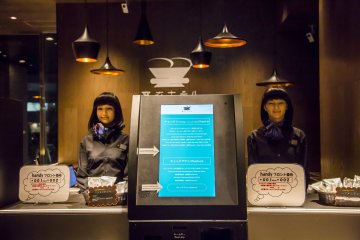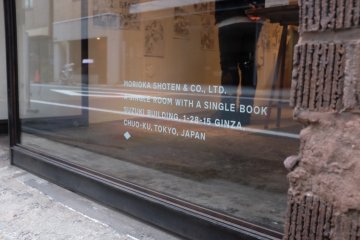Overview
Chuo City is home to some of Japan's most expensive real estate, high end shopping and corporate financial powerhouses. It is also the location of many of Tokyo's more down to earth places of interest.
Temples & Shrines
Tsukiji Honganji Temple
The eclectic design of Tsukiji Honganji Temple in Tsukiji is based on Indian motifs and features western stain-glass windows, German pipe organs and memorials to religious monks and modern rock guitarists. This Buddhist temple serves the Jodo Shinsu sect, Japan's most practiced school of Buddhism.
Outside Exit 1 of Tsukiji Station on the Hibiya Line.
Namiyoke Iinari Jinja
Two massive lion heads at almost two tonnes in total weight are the feature here at Namiyoke Inari Jinja in Tsukiji. Erected in gratitude to the gods for stopping the ocean waves that were destroying the local land, the shrine is pure blue-collar piety and faith. Watch for the full festival every three years that parades the lion heads through Tsukiji.
Five minutes from Exit A1 of Tsukijishijo Station on the Toei Subway Oedo Line.
Gardens & Parks
Hamarikyu Garden
Surrounded by concrete and glass reaching into the sky, Hamarikyu Garden is an elegantly designed garden space featuring seawater ponds whose levels change according to the tides as well as an island in the middle of the ponds where you can enjoy some Japanese tea and traditional sweets.
Five minutes from Exit 10 of Shiodome Station on the Toei Oedo line.
Ishikawajima Park
Reclaimed land along Sumida River, Ishikawajima Park features excellent views of Eitai Bridge and Tokyo Skytree tower as well being the location for the Paris Plaza, a recognition of the relationship between Japan and France. The two-tiered banks allow for casual strolling and is nice place to unwind for the locals.
Eight minutes from Exit 6 of Tsukishima Station on the Toei Oedo Line or the Yurakucho Line.
Museums & Galleries
Kite Museum
A tiny museum on the 5th floor of the Tameikan restaurant building, the Kite Museum is a veritable haven for quirkiness. Filled to the absolute brim with thousands of different kites, fans of the personal will fall in love with the intimacy that this pocket-sized museum will provide.
Two minutes from Nihonbashi Station on the Ginza, Tozai or Asakusa Lines.
Mitsui Memorial Museum
Located in the heritage listed Mitsui Honkan Building in Nihonbashi, the collection of the Mitsui Memorial Museum features over 4,000 works from the private stores of the Mitsui family. Celebrated creations from the Edo Period, famous calligraphic pieces and a stunning replica of the Jo-an tea ceremony room are just some of what is available.
One minute from Exit A7 of Mitsukoshimae Station on the Ginza or Hanzomon Lines.
Landmarks & History
Nihonbashi Bridge
A history dating back to the Edo period, the current stone Nihonbashi Bridge, with its lion and kirin statues and twin arch construction, is listed as an Important Cultural Property - despite being almost covered over with an expressway. The bridge was first built as a sign of prosperity and so too was the current stone one.
One minute from Mitsukoshimae Station on the Ginza or Hanzomon Lines.
Kabukiza
If Ginza is the home of luxury shopping, then Kabukiza is its cultural soul. The bastion of kabuki theatre, one of Japan's three representative performing arts, Kabukiza features a gallery of kabuki-related props and artefacts, a shrine, as well as the theatre itself. The building is simply stunning.
Direct access from Exit 3 of Higashi-Ginza Station on the Hibiya or Asakusa Line.










